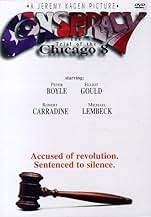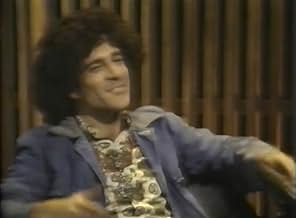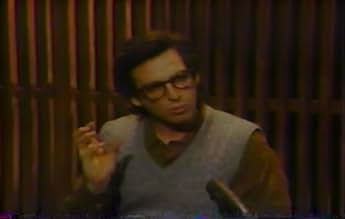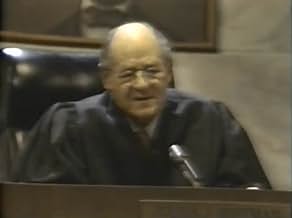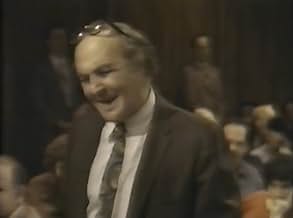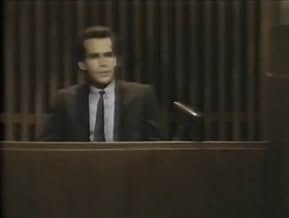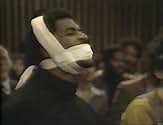Ajouter une intrigue dans votre langueA dramatized historical recreation of the Chicago Conspiracy trial with present testimonies by many of the participants.A dramatized historical recreation of the Chicago Conspiracy trial with present testimonies by many of the participants.A dramatized historical recreation of the Chicago Conspiracy trial with present testimonies by many of the participants.
- Prix
- 1 victoire et 2 nominations au total
Avis en vedette
Spectacular docudrama that highlights one of the most famous trials of the 20th century. The usage of the split screen and seeing the real defendants commenting on the trial as the actors are playing their parts is so innovative and amazing. The real Abbie Hoffman is as always so entertaining and a larger than life figure. So sad to know he killed himself a few years after he was filmed for this movie. Also the use of real stock footage is interspersed throughout and adds a layer of reality and mounting tension during the trial. Tremendous performances led by David Opatashu as the judge and a terrific cast of riveting actors makes this a must see television movie.
10ETL
Some TV movies make you wish for suicide and others entertain you. Still others do not belong, they seem to be real movies. This is one of them... I think this is a greatest TV movie of all time and a damn good movie.
10delbruk
This is an innovative, historical, and very well acted account of the US Government's attempt to put a generation of anti-war protestors on trial. From a political standpoint this film succeeds in outlining the key issues protestors had against the Vietnam War. From a legal standpoint this film succeeds in defining what may have been the most unorthodox and legally flawed trial ever to take place in America. On the artistic side, this film combines fantastic actors who embody the spirit of the true life defendants as well as offering intertwined detailed accounts from the participants themselves.
In respect to the reviewer who stated this wasn't what he remembered, I can only say that media accounts usually do not cover events accurately and that this whole docudrama is taken from the actual court transcripts. As someone who has taught and studied this trial and accounts, I assure you will not find better.
For an understanding of what divided and still splinters our country, this truly is required viewing.
In respect to the reviewer who stated this wasn't what he remembered, I can only say that media accounts usually do not cover events accurately and that this whole docudrama is taken from the actual court transcripts. As someone who has taught and studied this trial and accounts, I assure you will not find better.
For an understanding of what divided and still splinters our country, this truly is required viewing.
This is a docudrama about the trial of the Chicago 7. I earlier reviewed the recent 2020 Netflix film by Aaron Sorkin called "The Trial of the Chicago 7." The 1987 film has the advantage of including brief interviews with each of the defendants and the two defense lawyers. Both lawyers and at least three of the defendants were dead by the time of the 2020 film.
The unique characteristics of the 1987 film were that it takes place solely within the courtroom using language from the trial transcripts. The setting is that the viewer is in the position of a jury member; on numerous occasions, the lawyers speak directly into the camera. In the background on occasion, clips are shown from actual footage taken on the streets of Chicago and inside the convention hall. Bobby Seale (Carl Lumbly) has the highest profile in the film as his demand for recognition of his constitutional rights receives major play. David Dellinger (Peter Boyle) has a much larger role than in the Netflix film, as does Rennie Davis (Robert Carradine). Davis is a much stronger character than portrayed in the Netflix production.
Abbie Hoffman (Michael Lembeck) and Jerry Rubin (Barry Miller) play the Yippie roles well, though Abbie Hoffman has slightly less profile in this film. William Kunstler (Robert Loggia) is well-played; Leonard Weinglass (Elliott Gould), who is almost invisible in the Netflix production, has a significant profile in this one. The prosecutors, Richard Schultz (David Clennon) and Tom Foran (Harris Yulin), are even less sympathetic in the HBO film. Judge Hoffman (David Opatoshu) plays his biases very well.
In my mind, today's film from 1987 was superior to the 2020 Netflix film. I think some scenes are more memorable, especially the Bobby Seale-Judge Hoffman exchanges. Martin Sheen has a minuscule role as a businessman who witnessed some police bad behavior. Allen Ginsburg (Ron Rifkin) recites some of his poetry and does some om chanting to both the prosecutors and Judge Hoffman's dismay.
It's a good history lesson; I recommend it.
The unique characteristics of the 1987 film were that it takes place solely within the courtroom using language from the trial transcripts. The setting is that the viewer is in the position of a jury member; on numerous occasions, the lawyers speak directly into the camera. In the background on occasion, clips are shown from actual footage taken on the streets of Chicago and inside the convention hall. Bobby Seale (Carl Lumbly) has the highest profile in the film as his demand for recognition of his constitutional rights receives major play. David Dellinger (Peter Boyle) has a much larger role than in the Netflix film, as does Rennie Davis (Robert Carradine). Davis is a much stronger character than portrayed in the Netflix production.
Abbie Hoffman (Michael Lembeck) and Jerry Rubin (Barry Miller) play the Yippie roles well, though Abbie Hoffman has slightly less profile in this film. William Kunstler (Robert Loggia) is well-played; Leonard Weinglass (Elliott Gould), who is almost invisible in the Netflix production, has a significant profile in this one. The prosecutors, Richard Schultz (David Clennon) and Tom Foran (Harris Yulin), are even less sympathetic in the HBO film. Judge Hoffman (David Opatoshu) plays his biases very well.
In my mind, today's film from 1987 was superior to the 2020 Netflix film. I think some scenes are more memorable, especially the Bobby Seale-Judge Hoffman exchanges. Martin Sheen has a minuscule role as a businessman who witnessed some police bad behavior. Allen Ginsburg (Ron Rifkin) recites some of his poetry and does some om chanting to both the prosecutors and Judge Hoffman's dismay.
It's a good history lesson; I recommend it.
As someone who was living in Chicago in 1968 and very sympathetic to the Chicago 8 at the time, this is not quite the way I remember it. I went to high school (Berkeley-class of 57) with two of the defendants (Froines and Seale) and followed this trial about as closely (newspapers and TV accounts) as you could without being there in the courtroom.
While this film represents itself as factual and uses a lot of actual footage of the events, I don't buy it all. Judge Hoffman was not that tolerant or sympathetic nor defense attorney Kunstler that kooky, and little of what went on behind the scenes, especially with Mayor Daly, is not conveyed. This was one of the great political trials of the century and you don't get a sense of the true politics involved. One simple example is that the city of Chicago thought it was on trial, as much as the defendants were, and I got little feel for that from this account.
If you want the history of this trial read up on it, this movie must be taken with a bit of a grain of salt.
While this film represents itself as factual and uses a lot of actual footage of the events, I don't buy it all. Judge Hoffman was not that tolerant or sympathetic nor defense attorney Kunstler that kooky, and little of what went on behind the scenes, especially with Mayor Daly, is not conveyed. This was one of the great political trials of the century and you don't get a sense of the true politics involved. One simple example is that the city of Chicago thought it was on trial, as much as the defendants were, and I got little feel for that from this account.
If you want the history of this trial read up on it, this movie must be taken with a bit of a grain of salt.
Le saviez-vous
- AnecdotesThe screenplay was derived entirely from the transcript of the real "Chicago 8" trial. A message appears before the opening credits that reads "Everything you are about to see and hear actually happened."
- GaffesThe famous quote by Abbie Hoffman "You are a disgrace in front of the gentile - of which he said in Hebrew - does not appear in the movie.
- Citations
Jerry Rubin: I like being in here. It's very interesting.
Judge Julius Hoffman: That's the best statement I've heard here during this trial. You said you enjoy being in here?
Jerry Rubin: Sure. It's good theatre.
- Générique farfeluThe movie opens with the text: "Everything you are about to see and hear actually happened..."
Meilleurs choix
Connectez-vous pour évaluer et surveiller les recommandations personnalisées
Détails
Contribuer à cette page
Suggérer une modification ou ajouter du contenu manquant

Lacune principale
By what name was Conspiracy: The Trial of the Chicago 8 (1987) officially released in Canada in English?
Répondre
